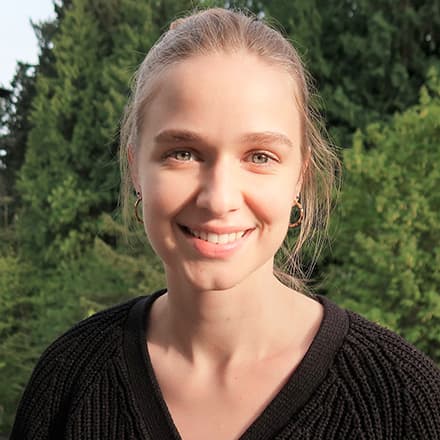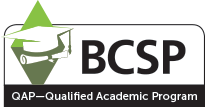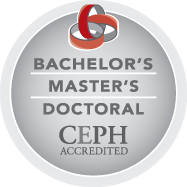Environmental and Occupational Health
Master of Public Health Option
Create healthy and safe environments to live, work and play
Applications reviewed on Dec 1 (Priority), March 1, & June 1 (Final).
Make communities and workplaces healthier and safer
Explore the impact of environmental and occupational hazards on human health and society, and develop effective interventions to control and prevent exposure to hazards.
As an applied program, our faculty conduct novel, interdisciplinary research. The foundation of our program is exposure assessment, toxicology, risk characterization and management strategies.
Our strength is our interdisciplinary approach in solving domestic and international challenges in environmental health and occupational health and safety.
Is environmental and occupational health right for you? Find out.
Experience an MPH in environmental and occupational health
Our MPH in environmental and occupational health program has a small student/faculty ratio that allows for a personalized learning experience.
As an EOH student, you’ll:
- Be matched with a faculty academic advisor to guide you through the program.
- Have access to faculty who can create opportunities to network and collaborate on research or outreach projects.
- Gain advanced critical thinking and analytical skills relevant for environmental and occupational exposure science and management.
- Master leadership skills to become an effective environmental and occupational health professional.
- Learn to solve environmental and occupational health challenges in practical ways for diverse populations.
With the ability to tailor the program, our students are highly successful and have rewarding careers improving people’s lives.
Affordability
Your graduate public health education is an investment in your future. We understand you must weigh the cost and benefits of your graduate education.
OSU’s MPH options are among the most reasonably priced in the Pacific Northwest.
We have reduced the tuition cost by nearly $4,000 to help address affordability and reduce barriers for the future of public health.
The Oregon State MPH participates in the Western Regional Graduate Program. You may be eligible to save about $8,000 in tuition over the course of the program.
Estimated costs
The MPH program is a 59-61 credit program that can be completed within 6 quarters on a full-time credit load (except for summer). Estimated costs for the whole program:
Resident
$31,591
Resident Tuition ($26,892)
+ Fees ($4,699)
Non-resident
$63,397
Non-resident Tuition ($58,698)
+ Fees ($4,699)
Western Regional Graduate Program
$45,037
WRGP Tuition ($40,338)
+ Fees ($4,699)
Tuition and fees estimates were calculated using the 23-24 academic year tuition and fees tables in combination with the tuition calculator. Please note, tuition and fees can change for the 24-25 academic year.

Natalie Wenzlick
MPH: Environmental and Occupational Health student
"I chose environmental and occupational health because I am interested in water and air quality and how they can impact our health, especially in the midst of this climate crisis. I am also interested in protecting workers’ rights, particularly when it comes to environmental or ergonomic hazards on the job."
MPH curriculum and coursework
The Oregon State MPH program requires 60 credit hours (about 40 semester credits), and culminates with an integrative learning experince. It does not require a thesis.
You’ll get hands-on experience, build professional contacts and learn from experts in the field as part of a required 200-hour professional internship. You’ll be guided along the way by a dedicated MPH internship coordinator.

See which courses you'll take as a environmental and occupational health student.

What you'll learn as an MPH student.

How you'll apply your knowledge.
Add a graduate minor in ergonomics
The graduate minor in ergonomics is for master’s and doctoral students who seek additional formal training and mentoring in ergonomic practice and human-centered design.
Environmental and occupational health career options
Our graduates work in a variety of settings around the world – from private industries in Oregon to rural health care clinics in Bangladesh. You could land employment in settings such as NGOs, health departments, federal or state agencies, academia or private companies.
Sample careers:
- Chemical compliance toxicologist
- Environmental consultant
- Environmental health and safety coordinator
- Health and safety director
- Public health officer

Laurel Kincl, PhD, CSP
Professor
“Our EOH program is unique with our small class sizes, which allow for a personalized learning experience. Students can be involved in research and professional activities through the opportunities faculty provide. Our students are highly successful, and graduates enjoy rewarding careers.”
We're here to help
For questions about the application process and requirements, contact College of Health graduate admissions.
To talk about curriculum and life as an MPH student, contact MPH Administrative Director:
Hanako Justice, MPH, MSW, CHES.
For academic or professional information specific to the environmental and occupational health MPH program, please contact program director:
Perry Hystad, PhD

Graduate Safety Practitioner® (GSP®) Qualified Academic Program
The Environmental and Occupational Health MPH program is recognized as a Qualified Academic Program (QAP) by the Board of Certified Safety Professionals (BCSP), meeting the qualified credential requirement for the Certified Safety Professional (CSP) certification.
- Benefits of Becoming a GSP (pdf)
- Upon graduation EOH MPH students can apply for the GSP (pdf)

Accreditation
Our BS, MPH and PhD Public Health programs are accredited by the Council on Education for Public Health. This distinction ensures your education meets the nationally-agreed-upon standards developed by public health academics and practitioners.